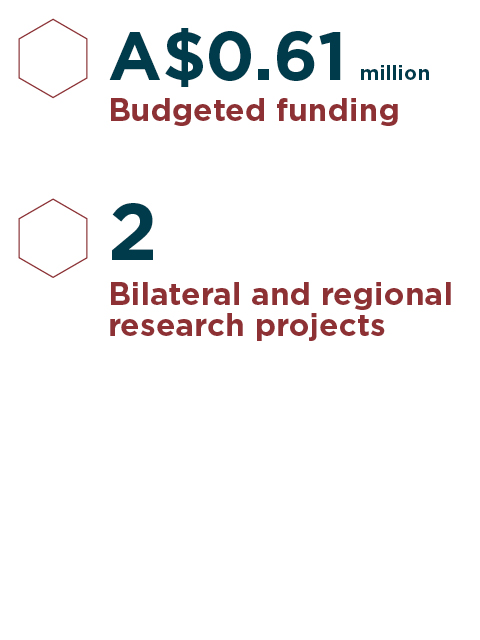Sri Lanka
-
File
After a 26-year civil war and a tsunami in 2004 that left tens of thousands of people dead, injured or homeless, Sri Lanka moved ahead rapidly to achieve middle-income country status.
Following the early optimism about prospects for the country after peace was established, in mid-2022 Sri Lanka is facing its worst ever economic crisis, with food and fuel price spikes driving civil unrest. Australia continues to have a strong interest in ensuring Sri Lanka can be a secure, stable and prosperous partner of Australia in the Indian Ocean region.
ACIAR had a broad collaborative research program with Sri Lanka from 1980 to the early 2000s, which covered fisheries, agriculture policy, forestry, animal health and crops. In 2016, Australia’s Commission for International Agricultural Research requested an assessment of re-establishing a collaborative research program with Sri Lanka. A scoping study3 identified 6 broad areas for potential future collaboration with Sri Lanka. Given that the partnership was new, we decided to start small with a single project. ACIAR was looking to this project to identify lessons for possible further re-engagement based on significant co-investment from Sri Lanka. The current economic and political crisis puts any possibility of re-engagement on hold.
2022–23 research program
The 2016 scoping study for ACIAR’s re-engagement with Sri Lanka identified 6 broad areas for potential future collaboration with Sri Lanka. Given that the partnership is completely new, in 2020–21 we started a single multidisciplinary project in aquaculture for freshwater shrimp, which includes a socioeconomic component, focused on communities in the Northern province.
This year we start a second project looking at ways to reduce food loss in fruit and value chains in Sri Lanka and Pakistan, as part of the Food Loss Research Program.
Agribusiness
Fresh fruits and vegetables are important food commodities in both Pakistan and Sri Lanka. Maintaining quality and freshness under humid tropical conditions presents a vast challenge in meeting the growing demand for domestic consumption and export. Supply chains are inadequate and inefficient. Food losses are large, especially during seasonal gluts. Associate Professor Anwar Shah of Quaid-i-Azam University leads a new project using mango and tomato as focal commodities to map value chains in Pakistan and Sri Lanka, to identify the extent and root causes of food losses. The project will design and demonstrate affordable technological and organisational options to mitigate losses and create new economic opportunities. Sri Lanka provides a useful case study to contrast its fruit and vegetable value chain against Pakistan, as the 2 countries are at different stages of development and face different exposure regimes and vulnerabilities. This project is part of the ACIAR–IDRC Food Loss Research Program.
Project: Developing food loss reduction pathways through smart business practices in mango and tomato value chains in Pakistan and Sri Lanka (Food Loss Research Program) (CS/2020/193)
Fisheries
Sri Lanka has a well-developed and sustainable inland reservoir fishery that makes up about 12–15% of total fish production and significantly benefits rural communities in the former conflict-affected Northern province. Based on a co-management strategy, management practices and stocking strategies for sustainable culture-based fisheries have been established in a previous ACIAR project and have increased the productivity of the reservoir fishery. The Government of Sri Lanka has long recognised the potential for the extensive culture of the indigenous giant freshwater prawn (Macrobrachium rosenbergii) in inland reservoirs, but development has been ad hoc, with productivity and returns relatively low. A project led by Dr Clive Jones of James Cook University investigates stocking, monitoring and harvesting practices to optimise fish and prawn productivity and improve product quality. The project will also conduct market-chain analysis to ensure farming practices meet market product requirements and benefits are socially equitable.
Project: Improved productivity, efficiency and sustainability of the culture-based fishery for finfish and giant freshwater prawn in Sri Lankan reservoirs (FIS/2018/157)
Regional Manager, South Asia
Research Program Manager
- Agribusiness: Mr Howard Hall
- Fisheries: Prof Ann Fleming
